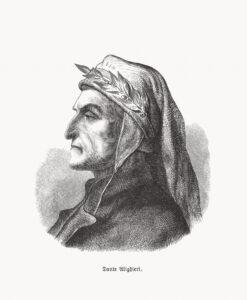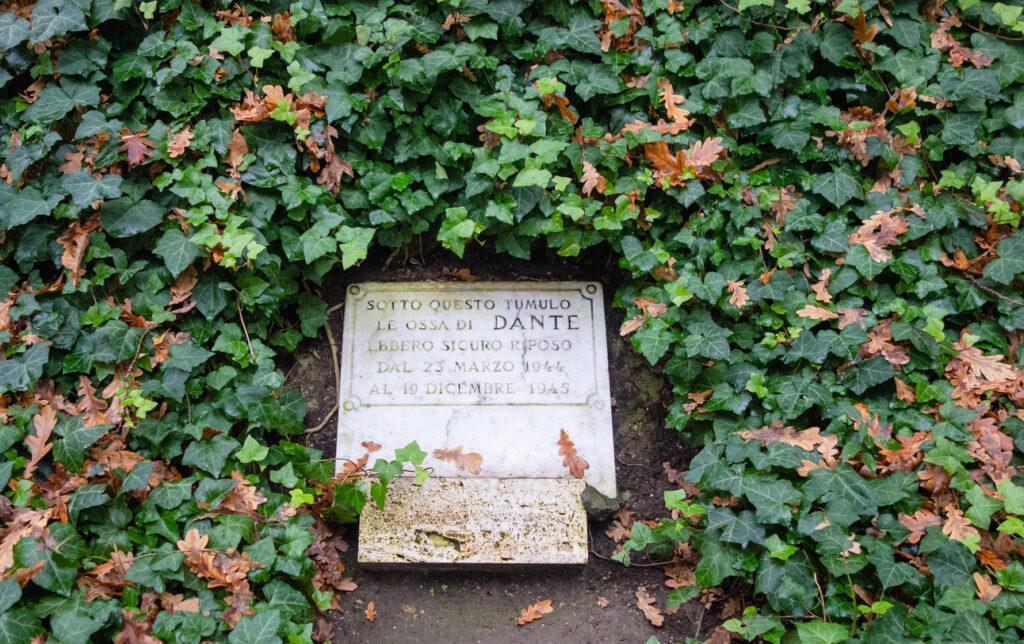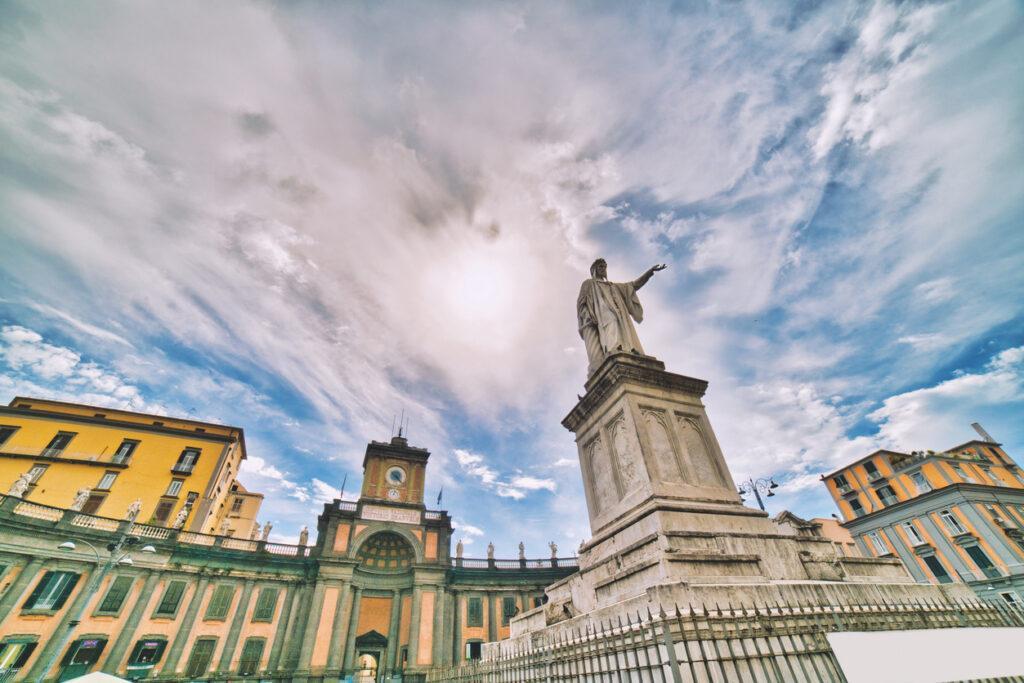March 25 is Dante’s day, the national day dedicated to Dante Alighieri.
The date is one that scholars recognise as the beginning of the Divine Comedy’s journey into the Afterlife and is an occasion to remember Dante’s genius throughout Italy and the world. The decision to celebrate Dante’s Day was taken in 2020 in anticipation of the 700th anniversary of his death in 2021.
The institution of the ‘Dantedì’ anniversary
The suggestion came from Corriere della Sera columnist Paolo Di Stefano, inspired by the day established to celebrate James Joyce, Blooms Day. At the hint of Francesco Sabatini, linguist and honorary president of the Accademia della Crusca, the Minister of Cultural Heritage and Activities Franceschini took action, and the Council of Ministers approved the directive to establish the Dantedì on January 17 2020.
The genius of Dante Alighieri
A genius has a natural, prodigious talent for one or more fields. A poet, a man of letters, a politician, and a scholar of philosophy and theology, Dante Alighieri – baptised Durante di Alighiero degli Alighieri – was born in Florence between May and June 1265 into a family of the petty nobility. Although the Guelphs, and thus defeated after the battle of Montaperti in 1260, the Alighieri were not so important among the Guelphs that they were exiled. Dante was, therefore, able to write that he was born and raised above the beautiful river of Arno in the great Villa (Inf. XXIII 93-94).

Dante’s studies
He studied the prominent Latin authors, grammar and philosophy, probably with the Franciscans of S. Croce, rhetoric and literature with Brunetto Latini and Bologna, where he was in about 1287. He began poetising at an early age; at the age of 18, according to his account, he wrote the first datable sonnet that remains of him in honour of Beatrice, whose figure should correspond to the person of Bice di Folco Portinari, who was married to Simone de’ Bardi and died on June 8 1290.
The Guelphs and Dante’s exile
When two factions arose between the Guelphs, who had regained command of Florence in 1267, Dante joined the Whites, supporters of the Cerchi, a modern family skilled in the trade. The Guelfi were opposed to Boniface VIII and his stubbornness. Dante, in 1302, held important positions in Florence; he was called to Rome by the Pope while the new podestà of Florence, Cante Gabrielli, condemned him to be burned at the stake and to lose his property. Dante, effectively exiled, never returned to Florence.
Dante’s Bolognese years: the Convivio and the De Vulgari Eloquentia
Between 1304 and 1306, he was in Bologna; he began two works full of doctrine in Bologna: the Convivio in the vernacular and the De Vulgari Eloquentia in Latin, works that reveal a broadening of literary, cultural, civil and political perspectives. Dante wanted, through them, to consolidate his reputation as an excellent scholar, to obtain a revocation of his sentence: nostalgia for his city and the hope of his return animate, with emotional accents, both works. In those years, however, Dante proclaimed himself a citizen of the world. The two treatises remained incomplete, both because of the expulsion of the Florentine exiles from Bologna in 1306 and because he devoted himself to the larger project of the “Comedia”.
The Divine Comedy
Described as such by Boccaccio in his “Trattatello in laude di Dante” – written between 1357 and 1362 and printed in 1477 -, the Comedia is a poem in tercets of hendecasyllables with chained rhymes (ABA, BCB, CDC etc.). It is divided into three cantiche, Inferno, Purgatorio and Paradiso, and each cantica is into 33 cantos; thus, the work, with the proem canto, consists of 100 cantos. According to the most careful critics, it was written between 1306 – 07 and 1321. It is written in the Florentine vernacular and is considered one of the greatest works of literature of all time: many people study it worldwide.
A Journey to the Afterlife
It is an imaginary and symbolic journey, made in 1300, at the age of 35 (“in the middle of the journey of our life”), into an afterlife based on the Christian conception of the Afterlife of the time the Supreme Poet lived. The metaphorical journey has the dimension of a dream. It begins when he finds himself catapulted into a dark forest, symbolising the difficult personal moment linked to the political situation of his exile but also to his poetics. Virgil will be his guide through Inferno, while his beloved Beatrice will be with him at the end of the journey in Purgatory and Paradise.
Dante’s itinerancy
Dante changed several places, from Sarzana to Lucca to the Casentino, then back to Lucca, where the news of Henry VII’s death reached him in 1313. The treatise, in Latin, entitled De Monarchia, in which he tends to demonstrate the necessity of a monarch for the well-being of the world and the independence of the Emperor from the Pontiff, probably dates back to the time of Henry VII’s descent in Italy.
Dante’s death
His death dashed his hopes of returning to his homeland, and he returned to travel: Verona until 1318 and then Ravenna. He died in September 1321, probably of malarial fever, on his return from a trip to Venice. His tomb is in the city of Ravenna.
Italy pays homage to him with many quality initiatives on the anniversary – the 700th – of his death. Here are the main ones.

The initiatives for Dante Tuesday
Dante in Avezzano
In Avezzano (AQ), pupils of the II A class of the Liceo ‘Bellisario – Torlonia’ organised a lectura Dantis. The event, entitled “Dante 2023. Dante in the Cathedral’, will take place at the Cathedral of St. Bartholomew and was promoted by the school headmaster Dr Damiano Lupo, with Prof. Federica Gambelunghe as the contact person. The artistic conception is by actor and director Corrado Oddi. Male and female students will engage in readings from Inferno, Purgatorio and Paradiso.
Monsignor Giovanni Massario will propose a reflection on ‘Candor lucis aeternae’, an apostolic letter by Pope Francis, published on March 25 2021, on the occasion of the seventh centenary of Dante Alighieri’s death.
Dante in Bitonto
They also commemorate the Supreme Poet in Apulia: thanks to the support of the Dante Alighieri Society, the ‘Committee for Dante 2023′ – composed of FIDAPA – BPW Italy, Bitonto Teachers’ Association, University of the Elderly, Bitonto History and Art Research Centre, ‘De Palo-Ungaro’ Archaeological Museum, A.E.D.E., UCIIM Bitonto section, Just British, Libreria Raffaello – Mondadori Point and Bitonto – has been set up. The Committee will organise the ‘Settimana dantesca (20-26 March)’ with various cultural initiatives in town. The municipality sponsors the initiative. There will be, over the seven days: docufilms, dramatisations of the Divine Comedy, round tables, conferences, a medieval dinner, ceremonies in the town’s high schools (on the 25th), to close, on the 26th, with a show of music, dance, and songs.
Dante in Bergamo and Brescia
Lombardy is very active in remembering Dante Alighieri. The Bergamo Committee of the Dante Alighieri Society, founded in 1821, which deals with the dissemination of Dante’s work, on the occasion of “Bergamo Brescia Capital of Culture 2023”, has started a collaboration with the Brescian association Siccomedante to organise the “Festival Dantesco”, as part of the project “Fronteggiar Bresciani e bergamaschi”.
The events
There are several events scheduled in both cities as early as February; among others: on March 30, a meeting entitled “Processo a Dante” (Trial of Dante) and on April 20, a performance entitled “All’Inferno” (In Hell), an account of the first cantica with actor readings, images and music.
Dante in schools
The “Certamen Dantesco”, now in its eighth edition, aimed at students in the last two years of high schools in Bergamo and Brescia, will also be held in these provinces. This year’s edition will take place in Bergamo and Breno (Brescia) on March 18, while the award ceremony will be on May 6 in Bergamo. This year’s theme is exile, understood as a historical experience and a metaphor for human existence. Students will test themselves with a textual analysis of tercets from some Inferno, Purgatory and Paradise cantos.
Dante in Ravenna
Dante’s tomb is in Ravenna; since 1921 – the 600th anniversary of his death – the Museum has been dedicated to him. There are many initiatives dedicated to him in the city of Ravenna. Since the establishment of Dantedì, there has been the ‘Meeting Dante – Guided tours to discover the Ravenna of the Supreme Poet’, organised by the tourist guides of Il Cammino di Dante, with the patronage of the Municipality of Ravenna – Tourism Department.
The initiatives
Every Sunday, in March and April, there are one-and-a-half hour guided tours of the various Dante sites: Classical tours linked to the figure and presence of Dante in Ravenna in the 14th century, in-depth studies dedicated to the mosaics and Paradise of Dante and San Vitale, to the Fascist period, when there was a tremendous urbanistic change in the area of Dante, to the poets and artists who felt the call of Dante and to Boccaccio‘s relations with Ravenna and admiration for the “Beloved Poet” elected as the ideal “magister” of life and poetry with a special appointment on Saturday, March 25 on the occasion of Dante’s day, with multiple visits.
The “L’Alloro di Dante” Literary Prize
In addition, the associations “Rinascimento Poetico” (Poetic Renaissance) and the “Centro Dantesco” have announced the Literary Prize “L’Alloro di Dante” Edition 2023, a national and international poetry competition, whose award ceremony will take place in the Basilica of San Francesco in Ravenna, where Dante is buried.
Read also: https://in-italy.eu/in-giro/pasquetta-in-emilia-romagna-luoghi-e-cibi/
Dante abroad
The genius of the Supreme Poet will also be celebrated in faraway Norway. The Dante Alighieri Society-Oslo Committee has organised a celebratory evening, inspired by Cantos V and XXVI of Inferno, on the meaning of Love and philosophical knowledge in the narration of Ulysses. The trait d’union between Dante and the greatest Norwegian playwright, Henrik Ibsen, whose most emblematic drama, Spectres, recalls the characters and the same theme of Dante’s Three Canticles, will be explored.

Dante online and multimedia
The RaiCultura site dedicates Many resources to the poet. You can consult them at the following link: https://www.raicultura.it/speciali/dantedi and on that of the Ministry of Cultural Heritage: https://www.beniculturali.it/evento/dantedi-25-marzo-2023.
In addition, the Twinkl platform provides numerous teaching resources for primary schools: colouring sheets and fact sheets on Dante to introduce children to the writer and poet. There will also be Dante coding (https://www.twinkl.it/resource/coding-dantedi-it-n-1645269137).
Dante at the cinema
Rai Cinema has thought of a multi-platform to dedicate to Dante Alighieri. First, you can participate in an edutainment journey on The Nemesis, the channel’s entertainment platform. It will be an innovative adventure: an immersive game in the dark forest, available for free from March 22. Whoever wins can watch the preview of the short film Inferno by Federico Basso and Alessandro Parrello. This film will be available from March 25, with the unreleased second short film Purgatorio – visible on RaiPlay and Rai Cinema Channel. In Florence, in Dante’s house, a space will be dedicated precisely to viewing the two short films.
Dante and Physics: Carlo Rovelli and black and white holes
“Dante has written the greatest travel story ever: a fabulous trip, a trip of the mind that goes where no one has ever been. “Abandon all hope O ye who enter” is written on that door, but Dante enters”. So says the theoretical physicist Carlo Rovelli and so, in his field, has he – his latest book is ‘White Holes’: ‘Today in the sky there are these holes, we see the horizons of black holes: those who enter there do not leave, we read in scientific texts’.
Rovelli goes there to “understand something we don’t yet know about nature”. He is moved by a desire for intellectual knowledge similar to Dante’s, albeit in distant times and domains.
Science, Philosophy and Literature
“Science is taking a journey with the mind to go where we have not yet been,” says Rovelli. ‘A scientific journey intertwined with a human adventure and thoughts from my readings in philosophy, literature and my lifelong curiosity. And just as Dante ended his journey in the Empyrean, in the presence of God, so Rovelli talks about white holes: ‘We go to the edge of the horizon of a black hole, we enter, we go down to the bottom, where space and time dissolve, we go through it, we come out into the white hole, where time is reversed, and from here we go out into the future’.
The intuition of the future
And Dante saw the future and helped create it seven hundred and more years ago, developing, through a passage, a journey into an eternal past, a perfect architecture, a myth that is simultaneously a promise of eternity.


